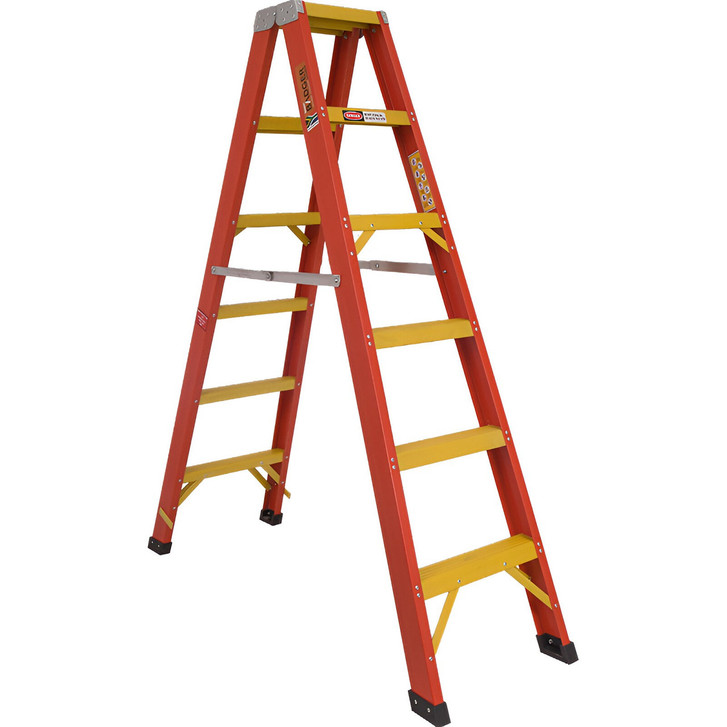Why It Matters
When it comes to working at height, there’s no margin for error. A good ladder manufacturer doesn’t just sell equipment; it proves safety, durability, and reliability through design, certification, and ongoing support. At Dreymar Industrial, we supply aluminium and fibreglass ladders as part of a wider access equipment portfolio, supported by site-specific consultation, installation, and lifecycle care. Here’s what to look for when choosing a ladder manufacturer you can trust.
Key Takeaways
- Choose a ladder manufacturer with verified safety certifications (EN 131, ANSI A14, OSHA 1910.23), backed by third-party testing and ISO 9001 quality systems.
- Look for engineered aluminium or fibreglass builds with secure locks, non-slip feet, corrosion resistance, and clear load/duty ratings.
- A strong brand offers a full access equipment range—step ladders, extension ladders, access towers, platforms—that integrates with materials handling workflows.
- The right partner provides end-to-end support, from consultation and installation to inspections, spare parts, and maintenance guidance.
- Compare total value over ladder prices—transparent warranties, responsive service, and low failure rates lower lifetime costs.
- For South African worksites, confirm local stock, quick delivery, and scalable supply to maintain uptime across multiple operations.
Safety Certification and Compliance
Safety is the foundation. Reputable ladder manufacturers back their products with global and local standards:
- EN 131 (portable ladders), ANSI A14, and OSHA 1910.23 (workplace ladders).
- Documented load ratings, slip resistance tests, and drop tests.
- ISO 9001 quality systems for consistent process control and fewer defects.
Always ask for certificates, test reports, and conformity documents—proof matters more than claims.
Engineering and Materials
Strong, safe ladders depend on material quality and design precision:
- Aluminium for lightweight durability and corrosion resistance.
- Fibreglass for electrical safety and non-conductive environments.
- Hybrid composites for specialised sites needing both strength and spark resistance.
- Features like secure locks, anti-slip feet, wide rungs, and corrosion-resistant finishes extend service life and reduce risk.
Product Range and System Fit
A good manufacturer doesn’t offer ladders in isolation. Look for:
- Step and extension ladders for routine tasks.
- Access towers and platforms for elevated, extended work.
- Custom mezzanines or modular platforms for space optimisation.
- Integration with materials handling equipment (trolleys, dollies, pallet jacks) to support efficient workflows.
Support Beyond the Sale
True value comes from lifecycle support:
- Site surveys and consultation to match ladders to risk and environment.
- Professional installation for high-bay, mezzanine, or multi-site projects.
- Routine inspections and service to maintain compliance and uptime.
- Parts availability for feet, locks, rungs, and spreaders to extend lifecycle.
Cost, Transparency, and Value
Don’t just compare price tags, consider total cost of ownership (TCO):
- Clear ladder prices by material, duty class, and height.
- Warranties that cover structural integrity, not just superficial defects.
- Responsive service and documented inspection intervals.
- Lower replacement frequency and downtime = better long-term value.
Fit for South African Worksites
For local operations, a reliable ladder supplier should offer:
- Local stock and fast delivery to reduce downtime.
- Proven solutions for South African conditions from coastal corrosion to high-bay warehouses.
- Access to both aluminium and fibreglass ranges for industrial, commercial, and electrical environments.
How to Vet a Ladder Manufacturer
Before choosing, take these steps:
- Request compliance documents (EN 131, OSHA, ANSI certifications).
- Inspect sample units for welds, rivets, locks, and slip-resistant feet.
- Audit lifecycle factors like service intervals, parts availability, and warranty coverage.
- Check delivery and stock depth for step ladders, extension ladders, and platforms.
Conclusion
Choosing the right ladder manufacturer isn’t just about buying equipment; it’s about securing safety, productivity, and value over the long term. Look for verified certifications, engineered materials, broad product coverage, and lifecycle support that goes beyond the sale.
At Dreymar Industrial, we deliver ladders and access systems tailored to South African worksites. From aluminium and fibreglass ladders to access towers, mezzanines, and full warehouse integration, our solutions are built to keep teams safe and productive.
Frequently Asked Questions
- What makes a good ladder manufacturer?
Safety certification, durable materials, proven engineering, and lifecycle support. Look for EN 131 and OSHA compliance, test reports, and transparent warranties. - Why do certifications like EN 131 and OSHA matter?
They confirm ladders meet global safety standards for load capacity, slip resistance, and durability—removing guesswork for site safety managers. - Which material is better: aluminium or fibreglass?
Aluminium is lightweight, durable, and corrosion-resistant; fibreglass is non-conductive and essential for electrical safety. The choice depends on environment and task. - How do I know which duty rating to choose?
Match the rating to the combined weight of worker, tools, and materials. Always choose a higher class if in doubt for industrial use. - What ladder solutions does Dreymar Industrial offer?
We supply aluminium and fibreglass ladders, access towers, mezzanines, and integrated materials handling solutions backed by consultation, installation, and ongoing support across South Africa.

